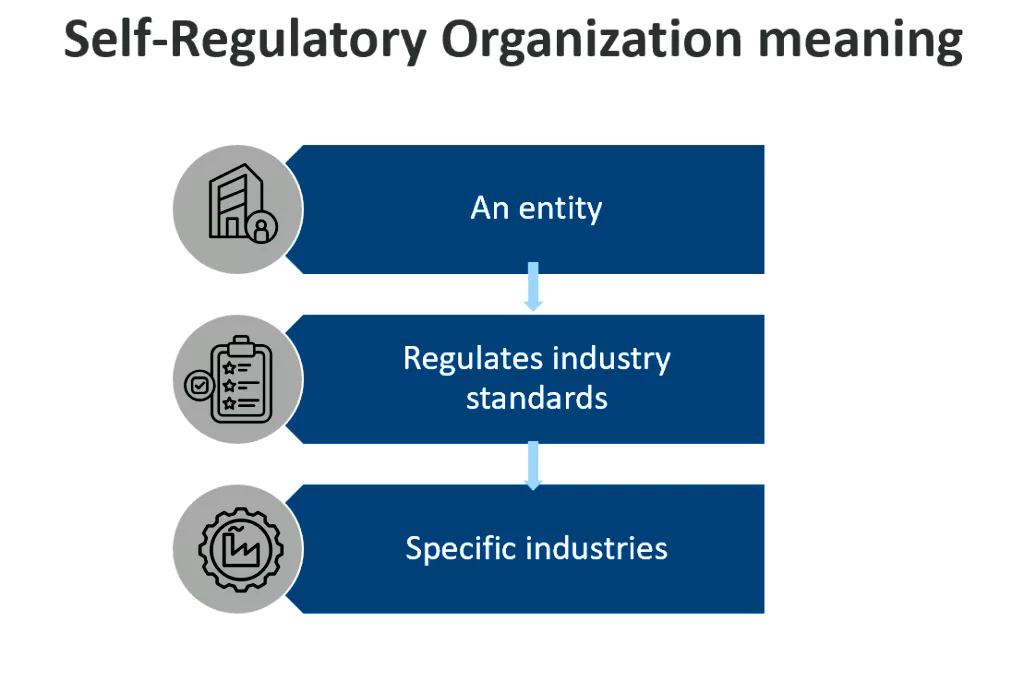The Reserve Bank of India (RBI) has released the final guidelines for self-regulatory organizations (SROs) in the fintech sector.
About Self-regulatory organizations (SROs)

An Self-regulatory organizations (SROs) is a non- governmental organization that has regulatory power over an industry or profession.
- It sets rules and standards for entities in the industry by collaborating with all stakeholders.
- Objective: The main aim of this body is to protect customers, promote ethics, equality and participants in the ecosystem.
Enroll now for UPSC Online Course
-
Function
- Regulatory Authority: It can regulate in place of or alongside government regulation.
- Self regulatory process uses impartial mechanisms for its administration.
- All members operate in disciplined way due to impartial mechanism and accept the penal actions.
- Source of Authority: Its regulatory power is independent of the government grants.
-
How can an entity become an Self-regulatory organization?
- Apply to RBI: All interested entities have to apply to RBI for getting recognition as SROs.
- Letter of Recognition: Regulator issues a letter of recognition upon finding suitability of the entities.
Key highlights of the framework for Self-regulatory organizations in the Fintech sector
- Objective and Responsible Functioning: SRO-FTs are expected to function objectively and responsibly under the supervision of the RBI.
- Their primary goal is to ensure the healthy and sustainable development of the Fintech industry.
- Diverse Membership: The framework emphasizes the importance of SRO-FTs having a membership that broadly reflects the Fintech sector.
- This includes entities currently regulated by the RBI, like NBFC-account aggregators (NBFC-AAs) and P2P lending platforms, and non-bank members.
- Focus on User Protection: SRO-FTs are obligated to address instances of user harm, such as fraud, mis-selling of financial products, and unauthorized transactions.
- Multiple SROs Allowed: The RBI may permit multiple SROs within the fintech sector.
- Membership Flexibility: Fintech companies may join more than one SRO and are encouraged to participate in at least one.
- Establishment of Surveillance mechanisms: The framework emphasizes deployment of Surveillance mechanisms for detecting exceptions, while maintaining confidentiality and collecting important data.
- There is a provision of cautioning, reprimanding, counselling, or even expulsion from the SRO in case of violation of rules and regulation.
- A reasonable penalty can also be imposed.
- Structured frameworks for monitoring: This framework encourages SROs to establish a framework for monitoring fintech activities and ensuring its compliance with regulatory standards.
- Dispute resolution framework: SROs are required to establish a dispute resolution framework for its members within the Fintech industry.
- In addition to it, this body is responsible for Proactively addressing industry-wide concerns beyond individual member interests.
- Representation of the interest: SROs are responsible for representing the interests of its members when interacting with the RBI.
- Along with it, it has to Keep the RBI updated on fintech developments.
- It is responsible for Collecting and sharing data with the RBI to aid in policy making.
- SROs are to report regulatory violations and systemic issues within the sector to the RBI.
Criteria for SROs in Fintech
- Membership and Governance:
- Representative membership: Ensure a representative membership that reflects the entire sector, including regulated entities like account aggregators and P2P lenders, NBFCs, and non-regulated entities.
- Function independently and impartially, free from any single member’s influence.
- knowledge repository: Act as a knowledge repository and avoid conflicts of interest.
- Allow fintech firms to participate in multiple SROs if needed.
- Structure:
- Non-profit Structure: SRO-FTs must be established as not-for-profit companies.
- Minimum Net Worth Requirement: SRO-FTs need to maintain a minimum net worth of Rs 2 crore within one year of being recognized by the RBI.
- Shareholding: Have diversified shareholding, with no single entity holding more than 10% of the shares.
Enroll now for UPSC Online Classes
| Feature |
Benefit |
Challenge |
| Objective Operation & Healthy Growth |
- Promotes responsible innovation within a stable regulatory environment.
- Encourages long-term, sustainable development in the fintech sector.
|
- Balancing innovation with regulatory compliance can be complex.
|
| Phased Regulatory Compliance |
- Provides a clear path for fintech companies to navigate regulations.
- Reduces uncertainty and helps companies prepare for future oversight.
|
- The specific timeline and requirements for phased compliance may not be immediately clear.
|
| Industry Standards and Best Practices |
- Establishes a common ground for ethical conduct across the fintech sector.
- Improves transparency, disclosure, and data privacy practices for consumers.
|
* Developing and enforcing consistent standards across a diverse sector can be challenging. |
| Representative Membership |
- Ensures all voices within the fintech sector are heard.
- Promotes inclusivity and addresses the needs of various segments.
|
- Reaching a consensus among different types of members on standards and regulations might be difficult.
|
| Independent Governance |
- Fosters trust and confidence in the SRO’s decision-making.
- Reduces the risk of undue influence from any single entity.
|
- Ensuring true independence from powerful members can be a challenge.
|
| Member Development and Conduct |
- Upskills the fintech workforce and promotes responsible business practices.
- Encourages a culture of compliance and consumer protection.
|
- Enforcing disciplinary actions against members may face resistance.
|
| Collaboration with Regulators |
- Creates a channel for open communication between the industry and regulators.
- Provides valuable insights for shaping regulations that are both innovative and consumer-centric.
|
- Building trust and a productive working relationship with regulators may take time.
|
![]() 31 May 2024
31 May 2024
